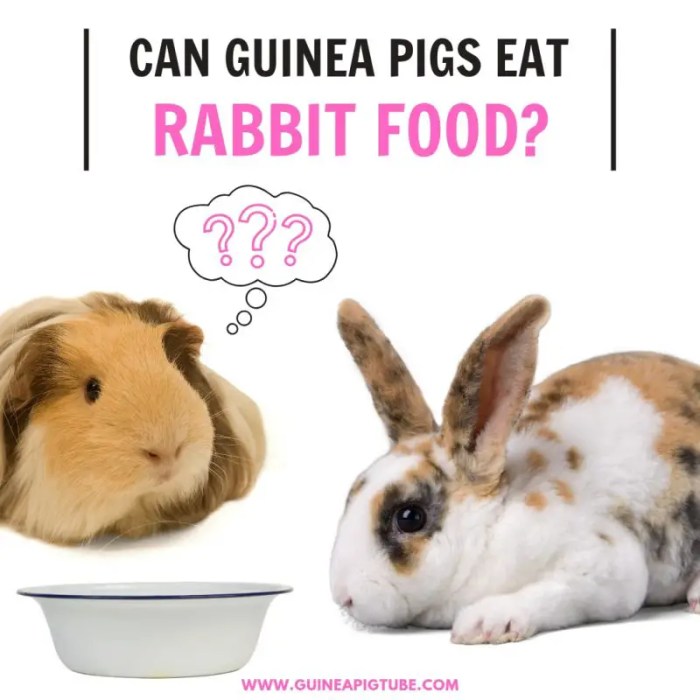Guinea pigs and rabbits are both beloved pets, but their dietary needs are vastly different. While rabbits are herbivores that can eat a variety of plant matter, guinea pigs have unique nutritional requirements that must be met to maintain their health.
This article will explore the potential risks and benefits of feeding guinea pigs rabbit food, providing a comprehensive guide to help pet owners make informed decisions about their furry friends’ diets.
Before delving into the specifics of rabbit food consumption, it’s essential to understand the fundamental nutritional needs of guinea pigs. Unlike rabbits, guinea pigs cannot synthesize vitamin C in their bodies and must obtain it from their diet. They also require a constant supply of hay, which provides essential fiber for their digestive system.
Additionally, guinea pigs need a balanced intake of carbohydrates, proteins, and fats to maintain their energy levels and overall well-being.
Nutritional Needs of Guinea Pigs
Unlike rabbits, guinea pigs cannot synthesize vitamin C in their bodies and require a steady supply of this nutrient through their diet. They also have a higher need for fiber and a lower tolerance for starch and sugar compared to rabbits.
Essential nutrients for guinea pigs include:
- Vitamin C: Found in fresh fruits and vegetables, such as bell peppers, broccoli, and oranges.
- Fiber: Found in hay, fresh grasses, and leafy greens, such as romaine lettuce and dandelion greens.
- Calcium: Found in leafy greens, such as kale and collard greens, and in fortified pellets.
- Protein: Found in hay, pellets, and fresh vegetables, such as broccoli and Brussels sprouts.
Ingredients in Rabbit Food
Rabbit food typically contains a variety of ingredients, including hay, pellets, and vegetables. These ingredients provide rabbits with the nutrients they need to stay healthy. However, some of these ingredients may not be safe for guinea pigs.
Hay
Hay is an essential part of a guinea pig’s diet. It provides them with fiber, which is necessary for their digestive health. However, not all types of hay are safe for guinea pigs. Alfalfa hay, which is high in calcium, can be harmful to guinea pigs and should be avoided.
Timothy hay or orchard grass hay are better choices.
Pellets
Pellets are a convenient way to provide guinea pigs with the nutrients they need. However, it is important to choose pellets that are specifically designed for guinea pigs. Rabbit pellets may contain ingredients that are harmful to guinea pigs, such as alfalfa meal or molasses.
Vegetables
Vegetables are a healthy and important part of a guinea pig’s diet. However, some vegetables, such as iceberg lettuce and cabbage, can cause gas and bloating in guinea pigs. It is important to feed guinea pigs a variety of vegetables to ensure that they are getting the nutrients they need.
Potential Health Risks

Feeding guinea pigs rabbit food can pose several health risks due to the significant differences in their dietary needs. Guinea pigs are herbivores that primarily consume hay, fresh vegetables, and limited amounts of fruits. Rabbit food, on the other hand, is formulated for rabbits, which have different digestive systems and nutritional requirements.
Digestive Issues
Rabbit food is typically higher in fiber than guinea pig food. While fiber is an essential nutrient for guinea pigs, excessive fiber intake can lead to digestive problems such as gas, bloating, and diarrhea. These issues can cause discomfort, reduce appetite, and interfere with the absorption of nutrients.
Nutritional Deficiencies or Imbalances
Rabbit food may not provide the necessary nutrients for guinea pigs. Guinea pigs require high levels of vitamin C, which is not naturally present in rabbit food. A deficiency of vitamin C can lead to scurvy, a serious health condition characterized by weakness, weight loss, and skin problems.
Symptoms of Health Problems
Signs that a guinea pig may be experiencing health problems related to rabbit food consumption include:
- Diarrhea or soft stools
- Gas or bloating
- Loss of appetite
- Weight loss
- Rough or dull coat
- Skin problems
- Lethargy
If you observe any of these symptoms in your guinea pig, it’s important to seek veterinary attention promptly.
Safe Alternatives for Guinea Pigs
Guinea pigs have unique nutritional needs that rabbit food cannot fulfill. Therefore, it is essential to provide them with alternatives specifically designed for their well-being.
Commercial Guinea Pig Food
Commercial guinea pig food is formulated to meet the specific nutritional requirements of these animals. It typically contains a balance of hay, pellets, and vegetables. Hay provides fiber for digestive health, while pellets offer essential vitamins and minerals. Vegetables provide vitamins, minerals, and antioxidants.
Fresh Fruits and Vegetables
Fresh fruits and vegetables are excellent sources of vitamins, minerals, and fiber for guinea pigs. Some safe options include:*
-*Fruits
Apples, bananas, berries, melons
-*Vegetables
Carrots, celery, cucumbers, dandelion greens, spinach
Hay
Hay is an indispensable part of a guinea pig’s diet. It provides essential fiber for digestive health and helps wear down their continuously growing teeth. Timothy hay and orchard grass hay are excellent choices.
Last Recap
In conclusion, while rabbit food may contain some ingredients that are safe for guinea pigs, it’s generally not recommended as a staple part of their diet. Guinea pigs have specific nutritional needs that are best met by a diet specifically designed for them.
By providing a balanced and varied diet rich in vitamin C, hay, and other essential nutrients, pet owners can ensure the health and happiness of their furry companions.
Answers to Common Questions
Can guinea pigs eat rabbit pellets?
No, guinea pigs should not eat rabbit pellets as they are not nutritionally balanced for their specific needs.
What happens if a guinea pig eats rabbit food?
Consuming rabbit food can lead to digestive issues, nutritional deficiencies, and other health problems in guinea pigs.
What should guinea pigs eat instead of rabbit food?
Guinea pigs should eat a diet specifically designed for them, which includes hay, fresh vegetables, and pellets formulated for their nutritional needs.